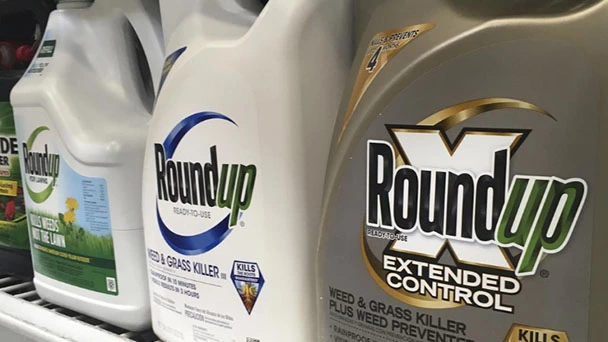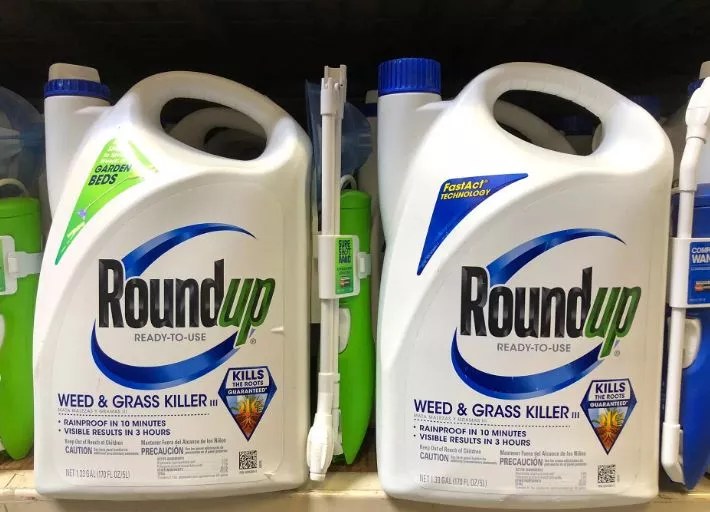Roundup Weed Killer Review - Is It Safe to Use
Written by Ivy
Jan 06 2023

One of the most widely used weed-killing products in the United States is Roundup, a popular herbicide with glyphosate as the active ingredient. The herbicide is reportedly used in domestic applications like lawn and garden weed control as well as the forestry and agriculture industries.
According to reports, the weed-killing properties of the active ingredient glyphosate are non-selective, meaning that most plants will also be killed by the chemical. Glyphosate is said to interfere with enzymatic pathways in plants, preventing growth and survival, and this interferes with weed growth. You can get rid of nutsedge by using Roundup Weed Killer.
In addition to being fatal to plants, Humans may be at risk from Roundup and other glyphosate products, which could even cause cancer.
Is Roundup Safe?
The EPA says glyphosate has "low toxicity for humans," which means in most cases, you would have to be exposed to large amounts of glyphosate for it to become harmful. Some glyphosate-based herbicides, however, may be more toxic than others due to the presence of additional ingredients.
Researchers frequently have trouble determining whether the presence of additional chemicals increases risk or how those chemicals might interact with glyphosate. Because of this, manufacturers do not have to list the names of these chemicals in the list of ingredients because they view them as trade secrets. As a result, it can be challenging for researchers to identify the precise chemical composition and concentrations of a given herbicide.
- Also Read Our 10 Best Weed Killer Guide
Roundup Risks
International regulators are divided on the subject of whether glyphosate exposure over an extended period of time can cause the cancer non-Hodgkin lymphoma. An agency of the United Nations' World Health Organization concluded in 2015 that it is "probably carcinogenic."
However, the Environmental Protection Agency of the United States has not identified a cancer risk. While conducting a routine review of the herbicide, the agency is still looking into potential risks.
Long-term, high-use exposure was linked to a 41 percent higher risk of developing non-Hodgkin lymphoma, according to a 2019 study published in the journal Mutation Research/Reviews in Mutation Research.
Monsanto has said "more than 800 rigorous registration studies" required by international regulators have failed to show any cancer risk. According to the manufacturer, Roundup is safe when used as directed on the label.
Executives were warned not to assert that Roundup is not a carcinogen in a 2003 internal Monsanto email. A company scientist claimed Monsanto had not conducted the necessary research to support the claim.
The National Pesticide Information Center claims that it was unable to find any evidence connecting glyphosate to asthma or any other illnesses besides cancer. The World Health Organization, the Environmental Protection Agency, and the Center have investigated how residue affects food and water as well as the potential effects of glyphosate on the environment, children, pregnant women, and animals.
- Read More: When to Apply Pre-Emergent
What Happens If I Got Roundup on My Skin?
Getting Roundup on your skin could cause skin irritation in the short term. You might experience eye irritation if you touch your eyes at that point. If a saline solution is available, rinse the herbicide off with it. The chemical can also be eliminated by immediately rinsing the affected area with water.
Users who breathe in Roundup during application can reportedly suffer from nose and throat irritation while swallowing the products can lead to increased saliva, mouth/throat burns, nausea, vomiting, and diarrhea.
Can Roundup Kill You?
Instances of intentional ingestion of glyphosate have reportedly resulted in deaths, although these are a relatively small number of incidences according to the Informational Center for Pesticides National.
In the long term, scientists are consistently debating the question: "Is Roundup harmful to people?"
Glyphosate was identified as a probable human carcinogen by the International Agency for Research on Cancer (IARC) of the World Health Organization in 2015. Despite this designation, organizations like the European Food Safety Authority and the U.S. According to the Environmental Protection Agency, glyphosate is not carcinogenic. In general, scientists agree that there needs to be more research on the issue — including the types of exposure and dosages of glyphosate which lead to cancer.
Uncertainty regarding the relative risk of glyphosate versus the other chemicals in formulations like Roundup contributes to the problem.
Have Any Roundup Cases Gone to Trial?
There have already been countless Roundup cancer lawsuits filed. In the past two years, three significant verdicts against Bayer have been handed down by juries who found that Roundup is dangerous. An ex-groundskeeper for a school district near San Francisco was the defendant in the first case to go to trial. Suffering from late stage non-Hodgkin lymphoma (NHL), the jury awarded the plaintiff $289 million in damages. Evidence surfaced in that trial indicating that Monsanto was ghostwriting much of its own research in order to "prove" to regulators that its product was safe. The business also had plans to refute the IARC's findings.
A federal jury awarded a man with non-Hodgkin lymphoma $5 million in compensatory damages and $75 million in punitive damages in March 2019. The man had received his diagnosis five years prior. A different jury decided in favor of a Livermore, Californian, several weeks later. couple, both of whom were also diagnosed with non-Hodgkin lymphoma. Jurors in that cases awarded a staggering $2 billion judgment, NPR reported.
Although these awards were significantly reduced in accordance with state and federal tort reform laws limiting punitive damages, All three cases are still under appeal by Bayer. Currently, Bayer is working with mediator Kenneth Feinberg to come up with a settlement – but it has shown no indication that it is willing to modify the product, add a warning or pull it from the market.
- Read More: How Long Does It Take For Roundup To Dry

Is Glyphosate on Food Dangerous?
The World Health Organization states that there is probably no cancer risk associated with glyphosate on food.
According to the organization, glyphosate exposure occurs primarily through food and water for the majority of people. But in 2016, a group of agency-affiliated pesticide experts came to the conclusion that people do not consume enough of the chemical through food to put them at risk.
Toxicology is determined by the EPA based on exposure over an extended period of time, possibly a lifetime. According to the agency's recommendations, a 200-pound man could consume nearly 159 milligrams, or 0.0056 ounces, of the chemical each day without experiencing negative effects.
Risks to Children and Pregnant Women
Children are more vulnerable than adults to the effects of pesticides, according to the National Pesticide Information Center. However, it turned up no evidence that children are more sensitive to glyphosate-based herbicides in particular.
The center issues a warning that because infants' livers and kidneys are still forming, they are less capable of removing pesticides from the body than those of adults. Additionally, children spend more time on the ground, breathe more rapidly, and have larger skin surfaces in relation to their body weight. Furthermore, kids are much more likely to put their hands in their mouths. These elements collectively may increase pesticide exposure.
The center advises limiting children's exposure to all pesticides, carefully reading label instructions, and taking practical precautions like washing kids' hands after they've been close to a pesticide-using area.
High levels of the herbicides infected pregnant rats, some of which developed reproductive and developmental problems. Rat fetuses exposed to high concentrations of the chemical struggled to gain weight, and some of them developed skeletal defects. Rats exposed at lower levels did not display these issues, according to researchers. The effects of glyphosate on pregnancy have not been examined in any significant human studies.
Pets and Other Animals
Pets that touch or consume plants that are still covered in glyphosate may experience health issues. The majority seem to be transient complications. Research into long-term issues for pets is scarce.
Symptoms of Glyphosate Exposure in Pets
- Diarrhea
- Drooling
- Drowsiness
- Loss of Appetite
- Vomiting
The EPA says glyphosate is "no more than slightly toxic" to birds. The agency also says it is "practically non-toxic" to honey bees and aquatic invertebrates, which are small creatures such as insects, worms and shellfish.
Certain glyphosate formulations are made specifically to manage aquatic plants. Although some glyphosate-based herbicides may contain other chemicals that can harm fish, glyphosate has a low toxicity for fish. To protect fish and aquatic environments, the EPA advises following label instructions.
Environmental Damage
Glyphosate in dead leaves degrades in eight to nine days, according to the National Pesticide Information Center. But under the right soil and weather conditions, the chemical can stay in the soil for up to six months. However, because it adheres to soil so firmly, it is unlikely to enter groundwater.
Some weed species have become resistant to the chemical as a result of increased use of glyphosate. There are few other options for controlling them, according to a 2014 study published in Pest Management Science, which found that at least 24 species are resistant to glyphosate and that 16 of those were discovered in fields with Roundup Ready crops.
Alternatives to Roundup
There are some Roundup substitutes that can be used in residential and even commercial landscaping. Alternatives to large-scale farming, however, are more challenging to find.
Roundup alternatives include:
- Vinegar
- Manual removal
- Flame
- Steam
- Hot-foam weeding
- Alternative commercial herbicides
- Mechanical farming (plow, no-till methods)
Alternatives that are readily available in the marketplace, according to the University of Maryland Extension Service, are less efficient than glyphosate. The use of alternative herbicides is advised along with other gardening techniques like irrigation and maintaining healthy soil. The service also looked at vinegar as a potential substitute.
Burning plants is typically how alternatives function. Particularly in direct sunlight, agricultural vinegar can quickly burn down plants. According to the service, vinegar can eliminate 90% of weeds that have been treated in a single day. However, it also includes a warning that it will kill any plant it comes in contact with, even ones that are desirable.
FAQs
How Much Exposure to Roundup is Dangerous
While no specific amount of Roundup was ever provided that would increase the risk, these researchers found that if a worker had exposure to Roundup over 10 years, their risk of developing non-The incidence of Hodgkin lymphoma significantly increased.
Is Roundup Bad for the Environment
One of the world's most widely used glyphosate-based herbicides, Roundup, can trigger loss of biodiversity, making ecosystems more vulnerable to pollution and climate change, say researchers from McGill University.
Latest Updated
- Benefits of Bugleweed - 7 Science-backed Health Benefits
- Bugleweed Dangers & Side Effects - Is It Poisonous?
- How to Plant Evergreen Trees - What You Should Know
- When to Plant Evergreens - Grow Guide for Evergreen Trees
- 12 Wonderful Evergreen Shrubs for Your Garden
- 12 Popular Evergreen Plants with Pictures for Beginners
- When And How To Prune A Lilac Bush Like a Pro
- How to Grow & Care for Lilac Vine (Hardenbergia Violacea)
- Japanese Lilac Tree (Syringa Reticulata) Care & Propagation Guide
- Shumard Oak Pros and Cons - What to Know
Popular Articles
- Winter maintenance of Antirrhinum Majus
- How to Grow Terminalia Mantaly Tree
- How to Grow and Care for Crossostephium Chinense
- How to grow Antirrhinum Majus in spring
- Peristeria Elata (Dove Orchid) Profile: Info & Care Guide
- Underwatered Snake Plant (Sansevieria Trifasciata) - Signs And How To Fix
- How to Care for Brazilian Jasmine Plant (Mandevilla Sanderi)
- How to Grow & Care for Graptopetalum Purple Delight in Summer
- Rosa Chinensis (China Rose): Plant Growing & Care Tips
- How to Care for Baby Sun Rose (Aptenia Cordifolia)